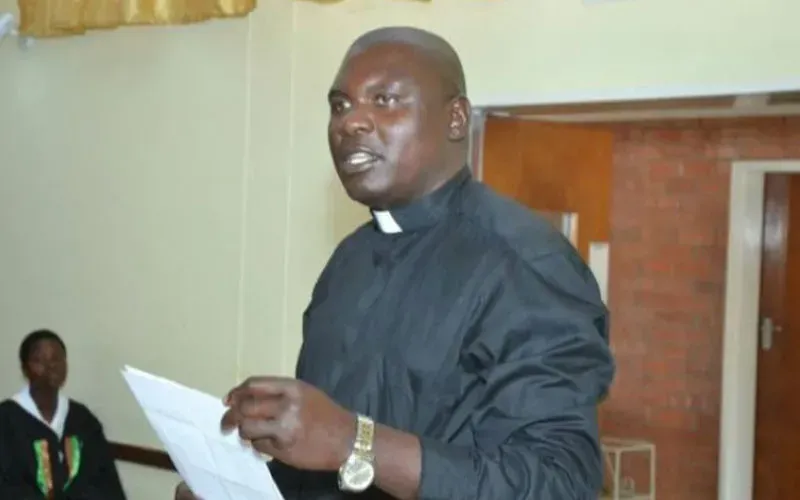
A Catholic Priest in Zimbabwe’s Bulawayo Archdiocese has expressed concern about the “dog-eat-dog” politics in the country saying it is the primary cause of suffering and hatred in the Southern African nation.
In his reflection published October 19, Fr. Limukani Ndlovu says that political conflict does not bring anything “good to the table” but undesirable energy that members of political parties generate in view of “controlling public opinion”.
“The dog-eat-dog politics in Zimbabwe is a cause of concern as it continues to tear the nation apart,” Fr. Ndlovu who serves as the Administrator of Emthonjeni Pastoral Centre of Bulawayo Archdiocese says.
He adds, “Political conflict does not bring anything good on the table but simply exacerbates public suffering and the perpetuation of hatred and generational poverty.”
In his reflection, the Zimbabwean Catholic Priest says that political conflict diverts people’s attention from more important issues besides undermining their dignity and downplays respect for human life.
Political conflict, he continues to say, “demoralizes and sharpens division leading to irreconcilable differences in communities; it leads to irresponsibility and ultimately a polarized people.”
Fr. Ndlovu makes reference to the Church’s social teaching and cautions, the “Church does not condone every possible form of social conflict”, including political ones.
As such, he further says in reference to the Social teaching of the Church, “the recurring political conflicts cannot be glorified as heroic acts in a multi-party democratic society.”
He adds that politics should seek to better the lives of the people across the political divide by giving them freedom to choose their destiny and path of life all times, without intimidation or manipulation of any kind.
In Zimbabwe and some other countries in election mood, Fr. Ndlovu says that there is need for not only tolerance but also political maturity among members of political parties and their constituents.
“Political parties should invest energy in clarifying and publicizing their ideologies and policies,” he says, adding, “They should resolve problems rather than engaging in political conflicts, coercion, deception, extortion, intimidation and violence.”
the Administrator of Emthonjeni Pastoral Centre of Bulawayo Archdiocese goes on to reflect on Pope Francis’ Encyclical Letter on fraternity and social friendship, Fratteli Tutti, underscoring the need for equal opportunities among the people of God in Zimbabwe in view of fostering development in the Southern African nation.
“Pope Francis warns that inequality and lack of integral human development make peace impossible and that without equal opportunities, different forms of aggression and conflict will find a fertile terrain for growth and eventually explode,” Fr. Ndlovu says in reference to the October 2020 Encyclical Letter.
The member of the Clergy of Zimbabwe’s Bulawayo Archdiocese reflects on the need for political maturity, saying that such politics facilitate the realization of “authentic and genuine communication of ideas rather than mere politicking and sloganeering.”
Interest-based approach to politics, he further says, “means putting a political party’s manifesto on the table and leaving it to the electorate to make uninfluenced choices, trusting and hoping that all that is promised will be delivered.”
He urges the people of God in Zimbabwe and other African countries to unite towards addressing conflicts occasioned by politics and engage in fostering peace.
“It is incumbent upon every citizen to overcome political conflict, which is a social ill and a scandal especially when Christians perpetuate it,” he says, and adds, “Political freedoms and fundamental rights to associate have to be respected and guaranteed by the state.”
Fr. Ndlovu cautions against political discrimination, saying, “No one should be reduced to second class citizen because of their political choices for every society benefits when each person and social group feels truly at home. No one should feel excluded on account of political differences.”
Making reference to the ongoing preparations for the Synod on Synodality, which Pope Francis has extended to 2024, the Zimbabwean Catholic Priest says that political groupings need to emulate the spirit of dialogue that the process of Synodality seeks to promote in view of overcoming “long-lasting, deep-rooted conflicts”.
“In the spirit of Synodality, political groupings should engage in mutual dialogue, especially where people have been engaged in long-lasting, deep-rooted conflicts. And so, they will pursue reconciliation and visible development,” Fr. Ndlovu says in his reflection published October 19.
